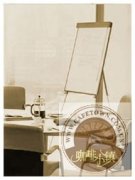The history of coffee shops once everyone worked in a coffee shop.
It is said that people who sit idle in Paris cafes all day are either artists or thinkers. Therefore, he (or she) ordered a cigarette to sit in a daze is stylish and stylish, saying that he or she is not too much at work. However, in the realistic and materialistic United States, if you come across some dedicated-looking handsome man or cool woman with blue buds in her ears and an apple in front of her, sucking a large iced latte somewhere in a cafe, don't confuse them with French idlers. These young people are seriously earning wages, but they just move their offices to cafes.
According to USA Today, 30 million office workers in the United States have "settled" in cafes during long working hours, accounting for 1/5 of the workforce and growing at a rate of 10 percent a year.
For freelancers who used to work from home, the popularity of cafes somewhat eliminates the tendency of "claustrophobia" caused by being alone for a long time; for companies, as long as employees have regular and quantitative "output", cafes are much more cost-effective than constantly expanding the company's office space. With the improvement of wireless network technology, there are many things that can be done in a cafe while enjoying the sunshine and drinking cappuccino. Send and receive EMAIL, communicate instantly online, read and survey materials, talk to customers on your cell phone, then send the finished documents to a nearby copy shop, and then pick up the printed documents on your way to the meeting.
Most of these office workers, known as the "Golden examination Generation" (Kinko's generation), are engaged in new media, consultants, sales, market planning and brokerage with flexible and diverse work styles. It is said that the federal government has recently launched a program to hire "outdoor" workers, which shows the popularity of this new way of working. As a result, of course, cafes compete for business in order to attract these regular customers. A good location, an atmosphere right to the road, complete supporting facilities (such as adjacent libraries, copy shops, etc.), wireless network and good and thoughtful service will become the first choice for people to "go to work". Of course, drinks and food are also essential for low price and good quality. Over time, "colleagues" who work in the same cafe have also formed a small circle, not only forming a good interpersonal network, but also no troublesome "office politics" to solve, which is indeed an ideal working environment. Different circles attract people with different interests and occupations, and the so-called popularity and fame spread. Some cafes even use some "office workers" to attract other customers, such as a designer regularly doing some free designs for coffee shop guests, like this, I would like to do it, but also bring mutual benefit to both sides.
Of course, such a loose team may also bring some management problems. After a year of work, you probably don't even remember the faces of your colleagues, but the most familiar person is the waiter who keeps refilling your glasses. For companies that value traditional forms of corporate culture and teamwork, this way of working is obviously a bit out of line, although it may itself become a new cultural breakthrough.
Despite the rigid rules of the traditional office, strict dress etiquette and boring and time-consuming gag, working in a cafe is not a way to do whatever you want. The first thing we can't forget is the result of our work. Whether you drink coffee or juice, your boss and customers always tell you what they want regularly, otherwise no one will pay for your lunch soon. Secondly, there are many unwritten rules and routines in the "coffee shop office". If you don't know each other, don't blame the waiter for being impolite. It's hard to hold the seat by the window.
Tips should be generous, needless to say, or you'll be uncomfortable all day. Just sitting is not enough. Every other hour, you have to order something. Consider it as paying for a seat, which is much cheaper than the rent of an office building in the same area. But even so, when there is a peak in the number of customers, it is still interesting to go out and get some air, so as to avoid the vicious glances of other customers and the suspicion of "not taking a shit in the manger". It's best to mute your phone and computer so as not to disturb others, and you'd better put your things in code, and don't pile your papers all over the desk, and the wires are three feet long, as if you were at home. Everyone is here to do serious work, do not chat up randomly, unless others also take the initiative to greet you, otherwise no one has time to chat with you, do not stretch your neck to peek at other people's computer screen, may sue you for attempting to steal trade secrets! You should also keep an eye on your own things. after all, it is a public place, and it is difficult to guard against thieves.
Regular customers are adept at everything from location to ordering and how to deal with waiters, and novices have to secretly learn a few tricks in order to become "the most popular employee in a cafe." But in any case, these are not troubles or obstacles, as long as they are not in the company office and home, cafes are still a favorite place for alternative office workers. But can "working elsewhere" really bring some psychological change to the "slaves" who still work for the capitalists? There may be no fixed answer. But working in a coffee shop is sure to give office workers a different feeling, and that's exactly what they want.

Important Notice :
前街咖啡 FrontStreet Coffee has moved to new addredd:
FrontStreet Coffee Address: 315,Donghua East Road,GuangZhou
Tel:020 38364473
- Prev

Italian coffee develops fashionable youth and Italian coffee
It seems that in that inadvertent moment, the fashionable coffee craze spread to all kinds of theme books, Starbucks chain stores stationed in office buildings of large commercial buildings, skilled people have opened personality coffee shops, and topics about coffee on the Internet also sprang up one after another, as if to feed the omni-directional Italian coffee stomach on the body. It is said that fashionable young people in the new century love Italian coffee.
- Next

Coffee Habits Coffee drinking habits of people in different countries around the world
One in three people in the world drinks coffee, but no two countries seem to drink coffee the same way. People in Arab countries like to drink small sweet coffee. French breakfast, the French like to drink coffee out of a bowl and blend with chicory root flavor. French people generally prefer weaker coffee than Italians. This coffee is usually
Related
- How did the Salvadoran coffee industry develop in Central America?
- What exactly does the golden cup extraction of coffee mean?
- The Origin of Coffee flower
- [2023 Starbucks World Earth Day] there are more meaningful things besides free Starbucks coffee!
- What kind of coffee is there in Spain? 9 Flavors of Spanish Coffee
- Aromatic African coffee| Kenya's coffee culture and historical production area
- Liberica Coffee Bean knowledge: the characteristics of Liberian Coffee beans of the three original species of Coffee beans
- The origin and formula of Spanish latte introduces the taste characteristics of Bombon coffee in Valencia, Spain.
- How to adjust the solution of over-extracted coffee
- What is the tasting period of coffee beans? What is the period of coffee and beans? How should coffee wake up and raise beans?

